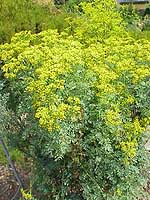Rue, the Herb of Grace

Shakespeare called rue the herb o'grace o'Sundays, and the English writer
Elizabeth Goudge called one of her novels Herb of Grace. Down through
the ages, rue has been the symbol of loss, regret and bitter lessons.
In the world of herbal medicine, rue does not have such a sad image, but
it is associated with astringency and fortitude. This is possibly because
this stubborn herb will grow anywhere, but seems to grow best in the poorest
soil in the garden.
In fact, if you want to grow rue successfully, pick the least attractive
spot, where nothing else has survived. Rue is not in itself an attractive
plant — it has a bitter taste and a disagreeable smell, and looks like
an odd little weed.
But for all its unprepossessing looks, rue is a very strong herb, and
it should be used with care. This Mediterranean plant has hidden virtues
and vices: the Latin name of this plant, ruta, comes from the Greek
reuo, which means freedom, and indeed herbalists believed strongly
that rue would provide freedom from many diseases. It was given magical
properties in ancient times and the Middle Ages, as a talisman against
witchcraft and an essential ingredient in spell breakers.
The Catholic Church gave rue its association with repentance and grace,
by using sprigs of rue to sprinkle holy water.
In spite of its bitter taste, it is edible, and can still be found in
rustic Mediterranean salads. But it is not advised to eat a lot of rue
or drink it as a tea, as it can be toxic in large amounts. The sap of
rue is also very strong and can actually burn the skin if it comes into
contact.
In the Middle Ages, when the Black Death scoured Europe in search of victims,
there were four thieves who robbed the bodies of the dead, apparently
impervious to the deadly contagion. When finally caught, they attributed
their immunity to a potion which came to be known as the Vinegar of the
Four Thieves. Rue was one of the ingredients in this extraordinary brew,
which also contained vinegar, lavender, sage, rosemary, mint, wormwood
and garlic. No doubt it stank to high Heaven, but then so did everything
else in the plague years.
But why would anyone be interested in growing rue today? Well, one possible
use for rue is as a deterrent to fleas. In olden times, rue was boiled
in water and strained, and the water was sprinkled around the house. This
was said to deter fleas and other pests.
As the four thieves proved, rue's astringent antiseptic properties make
it valuable. If you want a green alternative to harsh chemicals in your
kitchen and bathroom, a wash made with rue bruised and steeped in vinegar
will be an effective antiseptic for floors and surfaces.
Muslin bags of dried rue in closets and airing cupboards will deter insects,
and growing rue in the garden will help to curtail pests.
In earlier times, no herbal garden was complete without rue — but its
popularity has waned so much now that it is rarely seen. Most gardeners
prefer to grow plants that do not have to be handled with so much care.
But for those who want to recreate a medieval garden, or simply want to
grow a very useful household herb, rue still has some grace to offer.
|